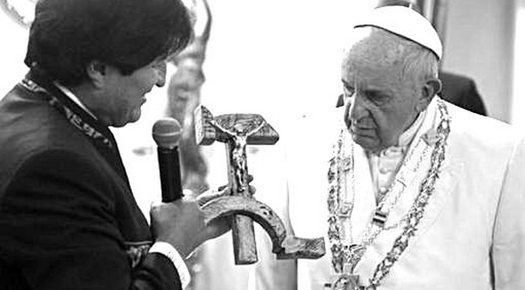
Pope Francis recently clarified that he was not offended by the Communist crucifix that Bolivian President Evo Morales gifted him during his pilgrimage across South America. Morales handed over the unusual gift, a crucifix attached to a hammer and sickle, when Francis visited La Paz earlier this month.
The crucifix is a replica of the one designed by late Jesuit priest Luis Espinal, who was tormented and murdered by the country’s paramilitary squad in 1980. Francis made sure to drop a visit to the site where Espinal was assassinated, once he arrived in Bolivia.
“Dear sisters and brothers. I stopped here to greet you and above all to remember. To remember a brother, our brother, a victim of interests who did not want him to fight for the freedom of Bolivia,” he said during the scheduled stop.
The modified crucifix caused some stir among those who question Morales, who happens to be rather unabashed about his socialist and non-religious stance. Those critics wondered whether Morales was attempting to make a political statement with his questionable and possibly blasphemous blending of ideology and faith. While Francis, who also happens to be an Argentine Jesuit, described Espinal as a friend and renowned proponent of the Marxist strain of liberation theology, the Holy See opposed Morales’ gesture with fears that Bolivian Marxists were making use of liberation theology’s ‘privileged option for the poor’ as a means to spark armed revolution against repressive right-wing regimes that had much of the power in Latin America during the 1970s and 1980s. This was possibly because Francis has been criticized in the past for failing to do enough to protect left-wing priests during the military dictatorship in his homeland. But the truth is, since assuming the role of the pontiff in 2013, Francis has taken significant measures to reconcile the Vatican with progressive adherents of liberation theology, who believe that the Church should play a more important role in bringing about political and social change.
During a press meet on his way back to Rome last week, the pontiff said he viewed Morales’ controversial present through a historical lens and interpreted it as Espinal’s protest art.
After taking into consideration the time in which he lived,” Francis said, “I understand this work. For me it wasn’t an offense.”
Quashing false reports that he had refused to accept the gift, Francis said he was taking home the crucifix that Morales gave him.
Earlier, the Bolivian government had insisted that there was no political subtext to the gift. In fact, the country’s communications minister Marianela Paco also said that she thought Francis, who describes himself as the poor man’s representative, would appreciate the gesture. “That was the intention of this gift, and it was not any sort of maneuver ... It was really from great affection,” she told the media.
Morales, a former coca farmer from an indigenous community, had previously upset the local clergy by declaring Bolivia secular through an amended constitution. However, he has always received Francis warmly and acknowledged him for supporting the poor and the marginalized.
During his trip, not only did the pontiff emphasize the problems faced by the country’s indigenous communities and call for the poor as well as the marginalized to have sacred rights of lodging, labour and land; but also sought forgiveness for the wrongs unintentionally committed by the Roman Catholic Church in its handling of Native Americans during what he described as the ‘conquest of America’.
Photo Credits: Uber Topic
